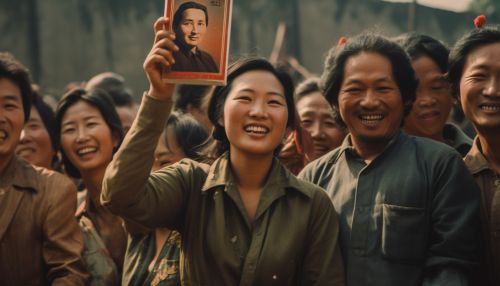Maoism
Origins and Development
Maoism, also known as Mao Zedong Thought, is a variant of Marxism-Leninism that was developed by Chinese leader Mao Zedong. It was the guiding principle of the Chinese Communist Party (CCP) from the time of Mao's rise to power in 1949 until the reform era of Deng Xiaoping in the late 1970s and early 1980s.


Maoism emerged from the experiences of the CCP in the Chinese revolution and the establishment of the People's Republic of China. It is a synthesis of the theories and practices of Marxism-Leninism with the concrete conditions of China, reflecting Mao's understanding of the laws of class struggle in Chinese society.
Key Concepts and Principles
Maoism is characterized by several key concepts and principles, including the mass line, the peasant-based revolutionary strategy, the theory of continuous revolution under the dictatorship of the proletariat, and the concept of "people's war".
Mass Line
The mass line is a method of leadership that seeks to bridge the gap between the party and the masses. It involves gathering ideas and suggestions from the masses, processing them within the party, and then returning the refined ideas back to the masses in the form of policies and directives.
Peasant-Based Revolutionary Strategy
Unlike traditional Marxism-Leninism, which sees the proletariat as the main revolutionary force, Maoism emphasizes the revolutionary potential of the peasantry. This reflects the demographic reality of China, where the majority of the population were peasants at the time of the revolution.
Continuous Revolution
Maoism posits that class struggle continues even after the proletariat has seized power. This is embodied in the concept of the Cultural Revolution, a mass movement initiated by Mao in the 1960s to prevent the restoration of capitalism.
People's War
The concept of people's war is a military strategy that involves mobilizing the masses to engage in guerrilla warfare against a more powerful enemy. It was successfully employed by the CCP in the Chinese Civil War.
Influence and Legacy
Maoism has had a significant influence on revolutionary movements around the world, particularly in the Third World. It has been adopted by various communist parties and guerrilla organizations, including the Shining Path in Peru, the Naxalites in India, and the New People's Army in the Philippines.
Despite the reform and opening up policies of Deng Xiaoping, which marked a departure from Maoist orthodoxy, Maoism continues to have a significant impact on Chinese society and politics. The legacy of Mao and his thought is a contentious issue in contemporary China, with some viewing him as a great revolutionary leader, while others see him as a dictator responsible for the deaths of millions.
Criticisms and Controversies
Maoism has been the subject of numerous criticisms and controversies. Critics argue that it led to mass violence and economic disruption during the Cultural Revolution, and that it is responsible for the deaths of millions due to famine during the Great Leap Forward. It has also been criticized for its emphasis on class struggle and revolutionary violence, which some argue is incompatible with the development of a peaceful and prosperous society.
